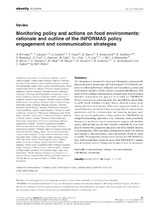Monitoring policy and actions on food environments: rationale and outline of the INFORMAS policy engagement and communication stategies
Date
2013Author
Brinsden, H.
Lobstein, T.
Sanders, David
Landon, J.
Kraak, V.
Sacks, G.
Kumanyika, S.
Swinburn, B.
Barquera, S.
Friel, S.
Hawkes, Corinna
Kelly, B.
L’Abbé, M.
Lee, A.
Ma, J.
Macmullan, J.
Mohan, S.
Monteiro, Carlos
Neal, B.
Rayner, M.
Snowdon, W.
Vandevijvere, S.
Walker, C.
Metadata
Show full item recordAbstract
The International Network for Food and Obesity/non-communicable
diseases Research, Monitoring and Action Support (INFORMAS) proposes
to collect performance indicators on food policies, actions and
environments related to obesity and non-communicable diseases. This
paper reviews existing communications strategies used for performance
indicators and proposes the approach to be taken for INFORMAS.
Twenty-seven scoring and rating tools were identified in various fields
of public health including alcohol, tobacco, physical activity, infant
feeding and food environments. These were compared based on the
types of indicators used and how they were quantified, scoring methods,
presentation and the communication and reporting strategies used.
There are several implications of these analyses for INFORMAS: the
ratings/benchmarking approach is very commonly used, presumably
because it is an effective way to communicate progress and stimulate
action, although this has not been formally evaluated; the tools used
must be trustworthy, pragmatic and policy-relevant; multiple channels
of communication will be needed; communications need to be tailored
and targeted to decision-makers; data and methods should be freely
accessible. The proposed communications strategy for INFORMAS has
been built around these lessons to ensure that INFORMAS’s outputs
have the greatest chance of being used to improve food environments.

